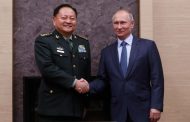
The recent Belt and Road Forum has underscored China’s continued importance to Southeast Asian leaders in driving their countries’ economic growth. During his visit to Beijing for the third Belt and Road Forum for International Cooperation, Indonesian President Joko “Jokowi” Widodo met with Chinese President Xi Jinping to discuss expanding and strengthening economic cooperation.
According to Chinese state media, President Xi expressed China’s willingness to enhance cooperation with Indonesia in emerging sectors like digital technology, photovoltaics, and new energy vehicles. Furthermore, China is open to increasing its imports of Indonesian agricultural and fishery products. The two leaders also discussed deepening industrial and supply chain integration, along with jointly advancing a regional comprehensive economic corridor.
Jokowi’s visit to Beijing comes as part of a larger delegation from Southeast Asia attending the Belt and Road Forum, including leaders such as Thai Prime Minister Srettha Thavisin, Cambodian Prime Minister Hun Manet, and Vietnam’s State President Vo Van Thuong.
For President Jokowi, China has long been viewed as a natural partner for infrastructure development in Indonesia, aligning with his Global Maritime Fulcrum initiative and the Belt and Road Initiative (BRI). This week’s Forum follows Jokowi’s inauguration of a China-backed high-speed railway connecting Jakarta to Bandung in West Java, the first such line in Southeast Asia.
While the project faced challenges, including delays and cost overruns, it represents a significant milestone for both China’s BRI and Jokowi’s presidency. President Xi referred to the high-speed railway as a “golden brand” of China-Indonesia BRI cooperation. Jokowi is expected to discuss extending the railway by approximately 700 kilometers to Surabaya during his meetings with Chinese leaders.
Additionally, Jokowi requested Chinese investment support for Nusantara, Indonesia’s new capital being constructed on Borneo island. He aims to inaugurate the new capital before his presidential term ends in 2024, but attracting foreign investors for this ambitious project has been challenging.
Despite increasing caution regarding large BRI investments, many Southeast Asian leaders, including Jokowi, continue to view China as a crucial partner for driving economic prosperity in the region. The Belt and Road Initiative’s 10th-anniversary Forum signifies China’s ongoing influence in Southeast Asia’s economic development.







